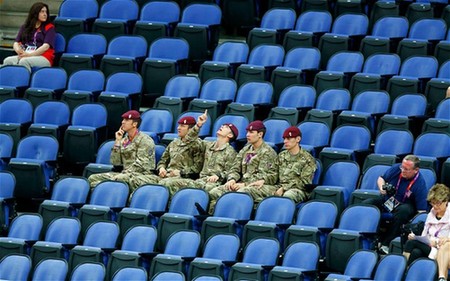IOC is a sitting duck in Olympic empty seat blame game
- By Gabrielle Pickard
 0 Comment(s)
0 Comment(s) Print
Print E-mail China.org.cn, August 5, 2012
E-mail China.org.cn, August 5, 2012
With an opening ceremony that was widely praised as the "greatest ever" and that cost more than $100 million to produce, the "spectacular" 2008 Beijing Olympic Games left London with a lot to live up to. However, with James Bond escorting the Queen in a helicopter to the Olympic Park, it has to be said that London 2012 certainly excelled in providing a thrilling and utterly unique opening ceremony.
|
|
|
Troops, students and teachers are being drafted in to help end the embarrassing spectacle of empty seats at London Olympic venues. [File photo] |
However the elation which followed the 'quintessentially British' and thoroughly enjoyable opening ceremony was abruptly punctured on the first day of the 2012 Olympics with the sight of empty seats at event stadiums and venues.
Not only is the sight of empty seats decidedly embarrassing, it also seriously dampens the atmosphere of an event and naturally angers the thousands who failed to get tickets for the Olympics after being told that events had 'sold out'.
Back in March 2011 when tickets for the London Games first went on sale, I was among the thousands poised at their laptops, frantically filling in the necessary fields to secure my seat in the Olympic Stadium. The dejection I felt when the official London Olympics site failed to process my order, basically because the site had crashed, was resurrected this week when I saw all the empty seats at the Olympics. "I could have been there!" I screamed at the TV!
The empty seat fiasco has naturally caused uproar in the UK, with Labour MPs demanding that Olympic chairman Seb Coe 'flex his muscles' to rectify the problem. Lord Coe's solution to the fiasco was to fill the empty seats with students and soldiers!
There has been no official explanation yet as to why so many seats, many of which are in prime positions in venues, have been empty. However, the widely held view is that 2.2 million tickets out of the original 8.8 million were allocated to those within the 'Olympic circle,' namely sponsors, hospitality partners and the International Olympic Committee (IOC). Many of these 'Olympic circle' elites that were automatically allocated tickets have therefore not bothered to show up and probably had no intention of showing up.
This is majorly infuriating to people like myself who genuinely wanted a ticket but were told they were 'sold out.'
What the IOC should have done was carry out preliminary research to determine who among the 'Olympic circle' actually wanted a ticket and intended to go to the London Games, before allocating them a seat.
"It's all very well saying that with hindsight", the critics of the critics may cry. However, what is doubly exasperating is that the IOC did have hindsight, thanks to the 2008 Beijing Olympics!
During the Beijing Games four years ago, China attracted criticism because the venues for some of the events were not full, even though the events were supposedly sold out. In response, volunteers dressed in yellow shirts were called in to fill the stadiums and create a better atmosphere.
In London, the 'fat cat' bosses of the Olympic sponsors, such as Coca-Cola and Visa, and their blatantly insincere interest in the Olympics, proven by the fact that they failed to show up, are being blamed for the embarrassingly high number of empty seats. In Beijing, the empty seats were blamed primarily on the hot and humid weather.
A full stadium naturally creates a more electric atmosphere, which is crucial to the overall success and legacy of an Olympics. Whatever the reason for London's empty seat fiasco, the IOC should have learned from a similar dilemma in Beijing and done everything in their power to negate the possibility of half-empty venues. Such efforts should have included refusing to haphazardly allocate 2.2 million tickets to people who obviously had no intention of using them.
The author is a columnist with China.org.cn. For more information please visit: http://www.keyanhelp.cn/opinion/gabriellepickard.htm
Opinion articles reflect the views of their authors, not necessarily those of China.org.cn.






